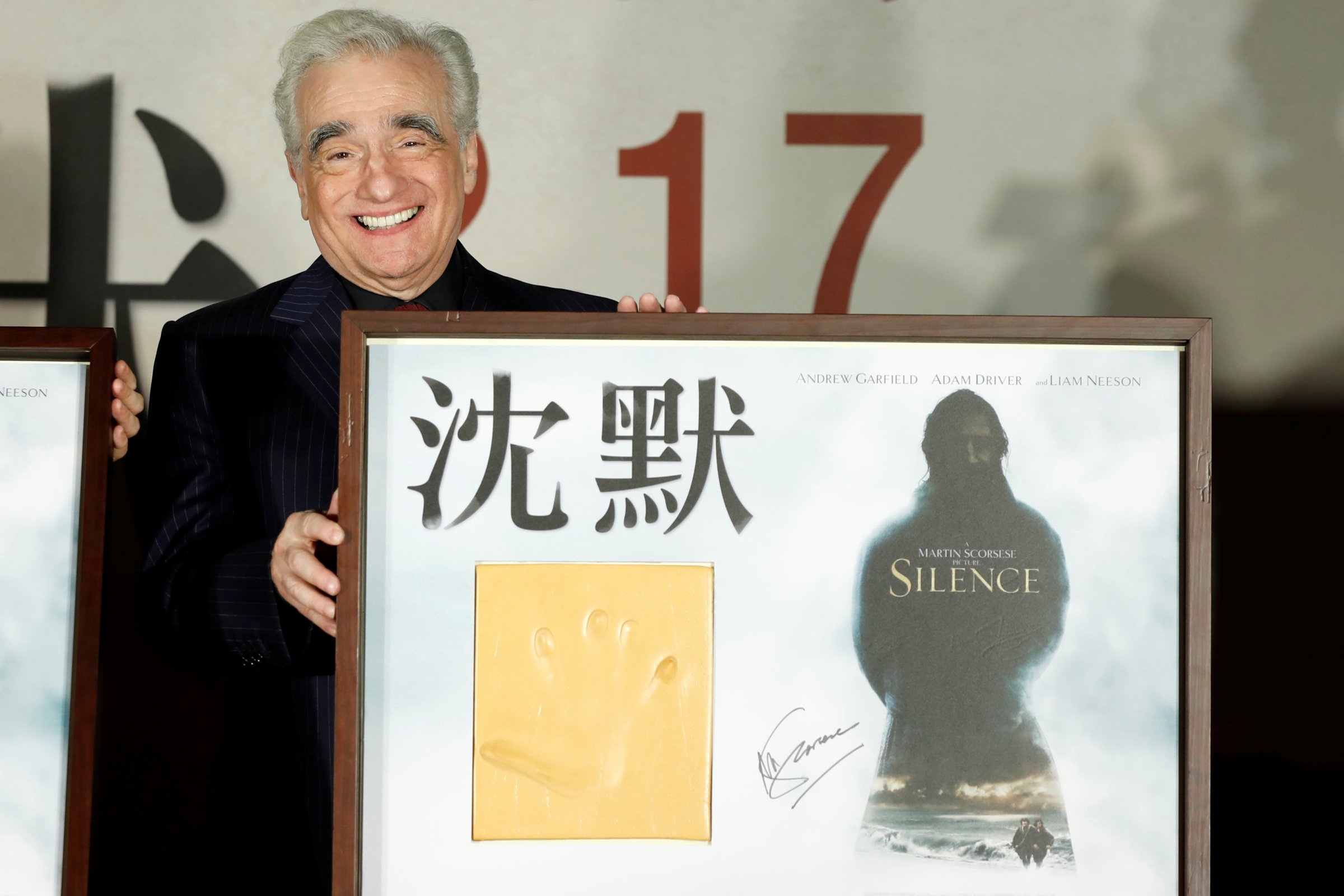
Silence, a sombre epic about Jesuit priests struggling to keep their faith in violently anti-Christian 17th century Japan, has been described as a life-long passion for acclaimed Hollywood director, Martin Scorsese, and as a possible Oscar contender.
But on Thursday evening, speaking at a cinema in downtown Taipei, 1,300 miles from the Japanese capital, Tokyo, Scorsese thanked Taiwan for making his project of almost 30 years finally come to life.
While the plot was set firmly in Japanese history, it was the scenic peaks and lush tropical rainforests of Taiwan’s Yangmingshan national park that provided the perfect dramatic backdrop.
“It was brought to fruition here in this extraordinary country,” he said. “This is something that has been a dream of mine for so many years. I hope it would be received as a gift to Taiwan and the Taiwanese people, who made this possible.”
Read More: Review: Scorsese’s Gorgeous, Haunting Silence Maps the Space Between Faith and Doubt
His audience was delighted. Investors from neighboring China are making major inroads in Hollywood, but Taiwan, an island democracy of 23 million people, is fighting to make its own mark on the global movie scene.
Competing against Japan, Hong Kong and South Korea, Taiwan is now emerging as a popular Asian location for Hollywood blockbusters, ever since Taiwanese-born director Ang Lee shot Life of Pi along the southern coast.
With stunning mountains and coastal scenery within easy reach of the capital’s skyscrapers, Taiwan offers both convenience and a subsidy of up to $1 million for filmmakers who meet the right criteria.
The cost-effective budget and large pool of local film professionals helped to persuade Scorsese to shoot in Taiwan, says Jennifer Jao, head of the Taipei Film Commission (TFC), a government-backed body that supports foreign film crews.
The Scorsese production, with stars including Liam Neeson and Andrew Garfield, was a coup for the TFC, which helps to make an average 650 foreign and local films, TV shows and commercials a year.
For the past eight years, Jao has raised Taiwan’s global profile by drawing foreign filmmakers to the island. The TFC was born out of Taipei’s frustration at losing the chance to host Mission Impossible 3 in 2006, after producers got so annoyed with bureaucracy that they shifted to Shanghai, China. The TFC is now a one-stop shop to help foreign film crews.
Jao has the enviable, but tricky, task to help famous directors scout locations on the small island in secret. On Scorsese’s first trip in 2014 he visited the popular Yangmingshan park during the Chinese New Year holiday.
“There were so many people on the mountain that some figured out it was Martin Scorsese. They tried to take pictures and [all the crew] including me was dancing around to try to cover him,” says Jao.
It was easier to shield French director, Luc Besson, in 2013 when he covertly scouted for his sci-fi thriller Lucy. Jao used a “secret elevator” in Taipei City Hall to take him directly to the mayor’s office.
But despite her success, Jao fears regional politics may block Taiwan’s chances to host films like Silence in future. “I’m still worried about the near future of the Taiwan film industry. Mostly because we are in a very sensitive historical moment,” she says.
Read More: See the First Trailer for Martin Scorsese’s Highly Anticipated Silence
Media professionals like Jao, believe the film industry has already been hurt by worsening relations between Beijing and Taipei. China regards Taiwan as a breakaway province, promising retaliation over moves toward independence, and recently condemning the refusal of Taiwanese President Tsai Ing-wen to publicly acknowledge Beijing’s “one China” policy.
“This has really affected all relationships and business across the Taiwan Strait, including the film industry,” says Jao.
This month, individual Taiwanese entertainers were allegedly blacklisted by China for their perceived pro-democracy views. Taiwanese director, Chen Yu-hsun, felt it necessary to publicly deny he supports Taiwan’s independence ahead of the release of his new film, The Village of No Return, a Chinese-Taiwanese co-production due out next weekend.
On Friday, Viacom Inc.’s Paramount Pictures announced a $1 billion investment from two Chinese film companies, the latest in a series of huge Chinese cash injections in Hollywood.
Jao fears that China’s economic clout in Hollywood could be used as political leverage to isolate Taiwan’s film industry. “We are in an unpredictable situation. What if they take the next step and put a banning order on the table to warn our partners from other countries?” she asks.
That concern is not unfounded, says Aynne Kokas, an assistant professor at the University of Virginia and author of forthcoming book, Hollywood Made in China. “Studios want to make sure that their film has the possibility of entering the Chinese market,” she says.
“When you look at Silence … one could imagine that the Chinese market wasn’t a huge consideration, and this is a film directed by Martin Scorsese so he has a lot of flexibility. But most directors don’t have that kind of flexibility.”
But for local producer Jay Lin, currently working with Filipino director, Joselito Altarejos, on his new film, Tale of the Lost Boys, the solution is simply to focus on the youthful moviegoing populations of Southeast Asia instead.
“I’ve chosen not to really focus on China as a market,” he says. “Especially as the subject matter that I focus on tends to be taboo subjects anyway, with LGBT-related characters.”
More Must-Reads From TIME
- The 100 Most Influential People of 2024
- The Revolution of Yulia Navalnaya
- 6 Compliments That Land Every Time
- What's the Deal With the Bitcoin Halving?
- If You're Dating Right Now , You're Brave: Column
- The AI That Could Heal a Divided Internet
- Fallout Is a Brilliant Model for the Future of Video Game Adaptations
- Want Weekly Recs on What to Watch, Read, and More? Sign Up for Worth Your Time
Contact us at letters@time.com